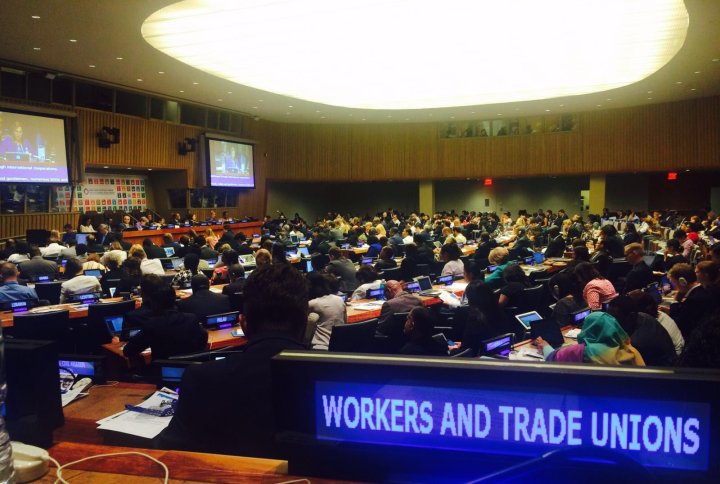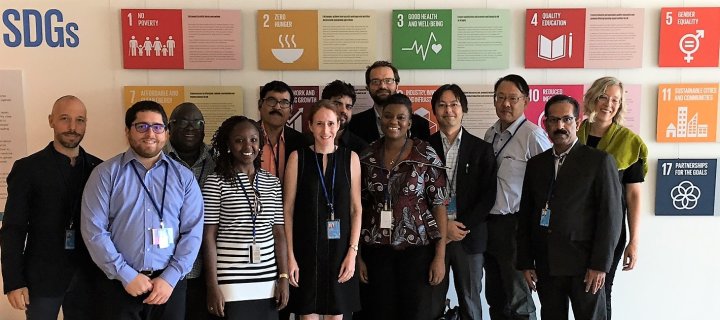The first week of the HLPF (10-14 July), which has a thematic focus, reviewed SDGs 1 (no poverty), 2 (zero hunger), 3 (good health and well-being), 5 (gender equality), 9 (industry, innovation and infrastructure) and 14 (life below water), including goal 17 (partnerships). During the second week of the HLPF (17-19 July), 44 countries presented voluntary national reviews (VNR). Trade union representatives from a number of these countries attended under the TUDCN-ITUC delegation, some of which within government delegations.
Reflections on this year’s HLPF
The level of interest this year’s HLPF generated across the international development community is encouraging and is a sign of some degree of commitment to this process. However, it is also quite clear that the HLPF remains a work in progress, which faces many challenges if there is any hope of maintaining the same level of interest in the years to come. Some of these challenges can be resolved through the program and modalities of the HLPF itself, while other issues are more deeply political and will require more earnest efforts from governments.
After the second review year of the HLPF, it is quite clear that the program needs to be adjusted to allow for greater discussion on the national level review processes. This can be done by extending the length of the VNR week from three to five days or by reversing the program so that the thematic week runs three days and the VNR week runs five days. The thematic week provides significantly more space for inputs from civil society groups, but still little in the way of interactive dialogue.
By contrast, the VNR week faces a much more fundamental challenge in that there is precious little time for any type of input from civil society groups, let alone for an interactive dialogue, which it should naturally lend itself too. The process risks becoming purely for show if it continues in its current formulation. At present UN Member States make publicity statements rather than genuine presentations and show little by way of ambition or sincere prospective analysis as to the situation in 2030. This is partly due to the fact that many VNR presentations are still in an implementation or stock taking phase.
Voluntary national reviews at country level
Experience with the VNR process at national level suggests a need for improvement. As the Trade Union Focus on SDGs in 8 VNR countries showed, governments need to improve their methods of consultation with civil society. Experience has been mixed in terms of openness, transparency and inclusion of the VNRs. This is due to a range of reasons, from governments not having any intention to consult, to governments themselves being under severe time pressure and not well coordinated to prepare the reviews.
To improve the VNR process there is a need for better coordination at all levels. This starts with the creation of an institutionalised setting for these reviews that brings together all relevant actors. This would improve the transparency and predictability of the consultations. It would also help to ensure that the VNRs do not become one-off reports with no follow-up action at national level.
Official channels need to be established to receive civil society input, supported by guidelines, for the integration of the national reporting. Following the production of the VNRs, governments would do well to undertake a validation exercise whereby civil society can “vet” the information which will be presented to the HLPF.
Finally, parallel monitoring of national reviews needs to be encouraged and space needs to be given to officially convey the messages that come out of such exercises so that they can complement the findings of the national reviews.
Read the trade union HLPF2017 highlights and interventions here.
Reflections on the ministerial declaration of the high-level segment of the 2017 session of the Economic and Social Council and the High-Level Political Forum on Sustainable Development
Positive to note:
- §1: pace of implementation must be accelerated as the tasks facing us are urgent;
- §3: commitment to combating inequalities and to inclusive and sustainable growth with decent work for all;
- §5 a substantial amount of attention to gender and equality (also see §8, 14, 15, 17…) and reference to including social protection systems;
- §7: attention to climate change and a strong reconfirmation to the Paris Declaration;
- §11: acknowledgement that there are also serious challenges within many middle-income countries; as well as a mentioning (§14) to the fact that more than 70 per cent of the world’s poor live in middle-income countries, mainly in sub-Saharan Africa and South Asia;
- §12: focus on “evidence base and analysis on gaps”, thus adding value to the Trade Union Focus on the SDGs to look a gaps in SDG implementation;
- §14: attention given to the implementation of nationally appropriate social protection systems and measures for all, including social protection floors;
- §16: investments in health contributes to reducing inequalities;
- §17: calls for action needed to address gender pay gaps, which remain pervasive across regions and sectors, including by recognizing and valuing unpaid care and domestic work, as advocated by TUDCN’s 2017 HLPF position paper);
- §18: recognition of inclusive and sustainable industrialization is integral for the structural transformation of economies in order to create decent jobs for all;
- §19: contribution of clean oceans to sustainable development and sustainable ocean-based economies, as well as to poverty eradication, food security and nutrition, maritime trade and transportation, decent work…
- §21: recognition of South-South cooperation as an important element of international development cooperation as a complement to, and not a substitute for, North-South cooperation;
- §22: acknowledgement of both the transformative and disruptive potential of new technologies, particularly advances in automation, on our labour markets, and on the jobs of the future and, in this regard, seek to prepare our societies and economies for these effects;
- §23: importance of building national capacities for follow-up and review;
Not so positive to note:
- No mention of living/minimum wage;
- No mention of social dialogue, freedom of association or collective bargaining;
- No mention of occupational health and safety;
- Very little mention of public services except for the health sector (§16);
- No concrete mentioning of re-skilling, except for mentioning “skills development” (§6), and to prepare us for disruptive effects (§22);
- No mention of vulnerable/informal/precarious workers are made under the list of “those who are in need” (§2).
The Workers and Trade Union Major Group messages to the HLPF were disseminated through the position paper entitled Fighting poverty and promoting gender equality. The paper emphasises the comprehensive approach of the Decent Work Agenda as a framework for the implementation of the SDGs. It highlights that successfully ensuring the components of the Decent Work Agenda is central to the achievement of SDG 1 (ending poverty), SDG 3 (good health and well-being), SDG 5 (achieving gender equality) and SDG 9 (industry, innovation and infrastructure).
Trade union representatives present were (including from government delegations): Koji Suzuki and Ryuichi Ikota (RENGO Japan), Raju Parackal John (INTUC India), Naome Chakanya (LEDRIZ Zimbabwe), Antônio Lisboa Amâncio do Vale (CUT Brazil), Ruben Wågman and Kristina Henschen (Union to Union Sweden), Maresa Le Roux (CGSLB/ACLVB Belgium), Bart Verstraeten (World Solidarity Belgium), Riccardo Sanna and Gianni di Cesare (CGIL Italy), Christian Weis (IG Metall Germany), Marie Nilsson (IF Metall Sweden), Haridasan Parayarikkal (ITUC Asia-Pacific), Alex Nkosi (ITUC Africa), Daniel Angelim (TUCA-CSA), Jane Njoki (COTU-Kenya), Moradeke Abiodun-Badru (NANNM Nigeria), Rosa Pavanelli and Sandra Vermuyten (PSI Global), Wellington Chibebe, Matt Simonds and Joan Lanfranco (ITUC-TUDCN).
Additional information:



